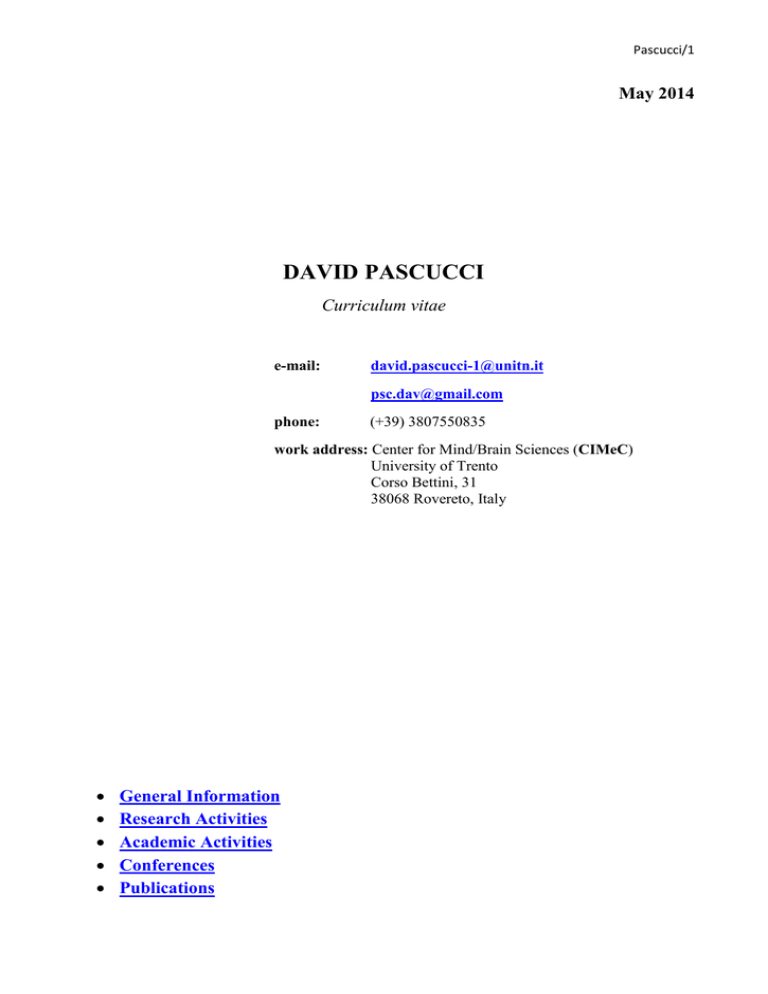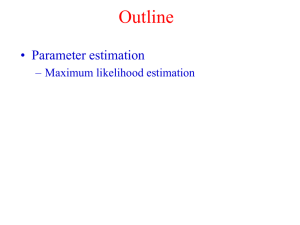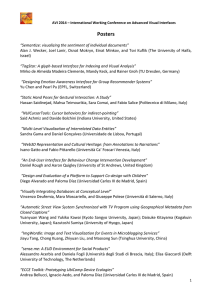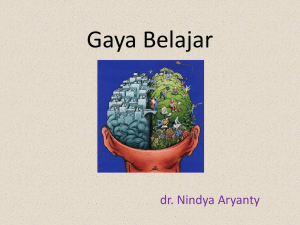Student's CV - Università degli Studi di Trento
advertisement

Pascucci/1 May 2014 DAVID PASCUCCI Curriculum vitae e-mail: david.pascucci-1@unitn.it psc.dav@gmail.com phone: (+39) 3807550835 work address: Center for Mind/Brain Sciences (CIMeC) University of Trento Corso Bettini, 31 38068 Rovereto, Italy General Information Research Activities Academic Activities Conferences Publications Pascucci/2 General Information Personal Details Date of birth: November 1st, 1982 in Città della Pieve (Italy) Citizenship: Italian Languages: Italian (native); English (fluent) Current Activity Phd student at University of Trento, Center for Mind/Brain Sciences (CIMeC, Rovereto, Italy). Project: “The role of endogenous reward on perceptual learning and brain plasticity”; supervisor: Professor M. Turatto. Education October, 2010 Internship at Perception and Sleep Lab, University of Florence, Department of Psychology (Firenze, Italy). Project: “Sleep parameters of daytime naps and their effect on perceptual learning”; supervisors: Prof. S. Baldassi and F. Giganti. February, 2009 Master Degree in Experimental Psychology, University of Florence, Department of Psychology (Firenze, Italy). Thesis: “How does sound improve vision? A classification image study”; advisor: S. Baldassi. Grade: 110/110 cum laude. September, 2005 Bachelor Degree in General and Experimental Psychology, University of Florence, Department of Psychology (Firenze, Italy). Thesis: “Neural correlates of timbre and rhythm perception”; advisor: N. Berardi. Advanced Training Workshop on EEGLAB: a software for analysis of electroencephalographic data based on Matlab. December 1-3rd 2010 (University of Trento). fMRI data analysis (BrainVoyager QX). October 28-30th 2013 (University of Trento). Computer Skills Programming: Matlab (Psychtoolbox, VSG/Visage), R. Analysis and graphical representation: SPSS, Stat, OriginLab, BrainVision Analyzer, Brain Voyager. Pascucci/3 Research Activities Research Interests My research interests lie generally in the understanding of the functions and processes that underlie our perceptual experience, emphasizing the crucial role played by other factors beyond the pure sensory processing. More in details, I have focused my studies on visual perception, with the aim to evaluate how the human abilities in performing low-level visual tasks (e.g., contrast and orientation discrimination, visual acuity, motion perception) can be strengthened, altered and even biased by other canonically conceived higher-level factors, such as attention and reward. Starting from these fundamental issues, my interests broaden in two main research branches that I have approached with behavioural, neurophysiological and computational methodologies. The first aim is to determine the role of attentional components during visual processing. Within this field, I have conducted several studies with different paradigms and methodologies (e.g., visual priming, visual masking, reverse correlation, attentional capture, steady-state visual evoked potentials) focused on understanding the attentional mechanisms by which visual perception can be improved or deteriorated (see Pascucci, Megna, Panichi, & Baldassi, 2011; Pascucci, Mastropasqua, & Turatto, 2012, for my published work on the topics of visual perception and attention). Another consistent part of my research, that has also been the main core of my Ph.D project, aims to characterize the effects of endogenous and exogenous reward on visual perception. The key issue of this topic is to investigate to what extent the low-level visual representations are altered when visual stimuli are paired with behaviourally relevant events (events with positive reinforcing value, such as the delivery of external reward or the correct execution of a task). On this regard, I have investigated the influence of different forms of reward on visual plasticity with paradigms of perceptual learning, visual persistence and visual adaptation (see Pascucci & Turatto, 2013, for my main published contribution in this topic; a brief summary of under-review papers is available on request). At present, I am also approaching this topic from a different angle, by conducting a functional imaging (fMRI) study to explore the nature and the neural basis of the reward-related effects on visual perception. Overall, the results I have collected corroborate and extend the hypothesis of a complex interplay between attention and reinforcement signals (reward) in shaping our visual abilities. The rich outcome of my Ph.D led to a recent project aimed at proposing a new computational model of perceptual learning. Visual Perception and Low-level Vision Attention Reward Perceptual Learning and Brain Plasticity Cross-modal Perception Psychophysics, fMRI, EEG, MEG, computational modeling Pascucci/4 Current Collaborations Hickey C., and Jovicich J. (CIMeC, University of Trento): Endogenous signals of reward in the mesolimbic system (fMRI project) Mazza V., and Infanti E. (CIMeC, University of Trento): Habituation of the orienting response to irrelevant onsets (EEG project) Khamassi M. (Université Pierre et Marie Curie, France): Computational models of Perceptual Learning. Research Experiences March, 2014 – EEG Lab at CIMeC (Rovereto, Italy). Prof. M. Turatto and V. Mazza. Project investigating mechanisms of attentional capture and habituation with the method of steady-state visual evoked potentials (SSVEP). Design and implementation of experiments. EEG data analysis. November, 2010 – Psychophysics Lab at CIMeC (Rovereto, Italy). Prof. M. Turatto. Psychophysical and computational work focused on attention, reward and perceptual learning. Methods: taskirrelevant perceptual learning, classical conditioning, visual adaptation, visual masking, computational modeling. February, 2009 – November, 2010 Perception and Sleep Lab, University of Florence (Florence, Italy). Prof. S. Baldassi and F. Giganti. Study investigating the role of daily naps on visual perceptual learning. Methods: polysomnographic recording, visual contrast threshold estimation. Design and implementation of the experiment, polysomnographic and behavioral data analysis. January, 2008 – February, 2009 Visual perception and Attention Lab, University of Florence, Department of Psychology (Florence, Italy). Prof. S. Baldassi. Psychophysical work on cross-modal perception. Methods: perceptual fields estimation, classification image (reverse correlation). Pascucci/5 Academic Activities Teaching Teacher of the module “Psychtoolbox 3.0” and Teaching Assistant in the “Matlab Scripting Course” for phd students. December 4-12th 2012 (CIMeC, University of Trento) Teaching Assistant in the course “Plasticità Corticale e Apprendimento Percettivo” held by Prof. M. Turatto, Faculty of Cognitive Science, academic years 2012/2013 and 2013/2014 (Rovereto, Italy). Student Mentoring 2008 – 2010 Tutor for the internship program in “Laboratorio di Psicologia Sperimentale”, University of Florence, Department of Psychology (Florence, Italy). 2012 – 2013 Tutor and referee of Matlab Scripting and Psychtoolbox 3.0 for phd students (CIMeC, University of Trento). 2011 – 2012 Supervisor of BA thesis: M. Venturini “Gli effetti del reward sulla percezione di stimoli visivi”. 2011 – 2014 Supervisor of undergraduate internship projects on perceptual learning, attention, reward and computational modeling. Pascucci/6 Conferences Invited Talks November, 2013 CODISCO 2013 (Noto, Italy). “Attention, Reward and the hypothesis of two distinct channels”. November, 2009 CNR Institute of Neuroscience (Pisa, Italy). “Acoustic cues to visual detection: A classification images study”. Oral Presentations Pascucci D., Mastropasqua T., Turatto M. (2011) Expectation and priming affect pop-out targets visibility. The European Society for Cognitive Psychology (ESCOP), San Sebastian, Spain. Poster Presentations Pascucci D., Mastropasqua T., Turatto M. (2013) Monetary incentives modulate internal signals of reinforcement. Rovereto Attention Workshop (RAW), Rovereto, Italy. Pascucci D., Mastropasqua T., Turatto M. (2011) Expectation and priming affect pop-out targets visibility. Rovereto Attention Workshop (RAW), Rovereto, Italy. Pascucci, D., Megna, N., Panichi, M., & Baldassi, S. (2009). How does sound improve vision? A classification image study. Perception, 38, 18. European Conference on Visual Perception (Regensburg, Germany). Awards Best oral presentation at CIMeC Doctoral School Day, 21st September 2012 (Rovereto, Italy) Pascucci/7 Publications Refereed Publications 1. Pascucci, D., & Turatto, M. (2013). Immediate effect of internal reward on visual adaptation. Psychological science, 24(7), 1317-1322. IF: 4.431 2. Pascucci, D., Mastropasqua, T., & Turatto, M. (2012). Permeability of priming of pop out to expectations. Journal of vision, 12(10), 21. IF: 2.479 3. Pascucci, D., Megna, N., Panichi, M., & Baldassi, S. (2011). Acoustic cues to visual detection: A classification image study. Journal of vision, 11(6). IF: 2.479 Under-Review Pascucci, D., Mastropasqua, T., & Turatto, M. Monetary reward modulates task-irrelevant perceptual learning for invisible stimuli. Pascucci, D., & Turatto, M. The distracting impact of repeated visible and invisible onsets on focused attention. Mastropasqua, T., Galliussi, J., Pascucci, D., & Turatto, M. Location transfer of perceptual learning: The role of passive stimulation, attention, and double training. Pascucci, D., Infanti, E., Mastropasqua, T., & Turatto, M. Endogenous reward and shortterm visual plasticity.


